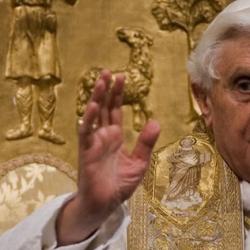Mark Evan Bonds’s Absolute Music is a study of 19th-century debates concerning the purity or absoluteness of music, the question of the possibility and/or propriety of segregating music from the rest of the world, music as a sheer aesthetic experience, an experience of pure beauty or simple form. It’s a debate with a long afterlife in modernist music, not to mention the modernist movements in other arts.
Advocates of absolute music claim that “music’s essence as autonomous, self-contained, and wholly self-referential. ‘Absolute music’ is the most common of several terms used to convey this conception, which manifests itself most clearly in compositions that have no text to be sung and no titles or accompanying descriptive terms that might in some way suggest what a particular work might be ‘about.’” Bonds notes that there sort of music in view is, at one level, quite obvious: “We can readily distinguish between the nature of a piano sonata by Mozart and Berlioz’s Symphonie fantastique, with its elaborate prose program describing an ‘episode in the life of an artist’” (1). But the debate ranged far beyond this straightforward distinction.
Bonds points out that Wagner first used the phrase “absolute music,” and used it disparagingly: “It was coined in 1846 by none other than Richard Wagner, who used it as a pejorative in his efforts to expose the limitations of purely instrumental music, thereby providing a justification for his own theory of opera. To Wagner’s mind, a self-contained art of pure form could serve no useful purpose in society: it was ‘absolute’ in the sense that it was isolated, sterile, and irrelevant to life.” That’s not the kind of music Wagner wanted. He wanted music that would foster social revolution (1-2).
On the other side was “Eduard Hanslick, who in his brief treatise Vom Musikalisch-Schönen (On the Musically Beautiful, 1854) celebrated precisely those qualities of abstraction and isolation so repugnant to Wagner.” Hanslick’s politics were conservative, and he wanted to arrest the power of Wagner’s revolutionary opera. But his aesthetic theory was far more radical and novel than Wagner’s: “Wagner’s idea was scarcely novel: the socially disruptive potential of music had been recognized long before by Socrates. . . . Hanslick’s view of music as a wholly self-contained art, by contrast, would figure prominently in several currents of modernist aesthetics in the early twentieth century. Serial composition and the aesthetics of ‘New Objectivity’ (Neue Sachlichkeit), both of which emerged in the 1920s, owed much to the premise of music as an art of pure form, even if figures like Schoenberg, Stravinsky, and Hindemith had no desire to be associated with a critic from a previous generation whose reputation was that of a hard-boiled reactionary.” Ironically, “it is Hanslick and not Wagner who emerges as the more forward-looking of the two, though not in ways that Hanslick himself could have anticipated” (3).
Bonds is skeptical about the claims for the absoluteness or purity of music, the notion that “we can somehow hear, contemplate, and discuss music entirely on its own terms,” or that music is about nothing more than the notes and sounds. Citing Richard Taruskin, Bonds writes, “such claims isolate music from the humans who write, perform, and listen to it and who never do these things—and never could do these things – in a sphere somehow cordoned off from everyday existence. The claims of purity and autonomy, qualities closely associated with absolute music, frequently mask their own ideological premises. We always listen to or think about music within a specific historical moment and cultural context, and the idea of ‘pure’ music is itself an abstraction, for the ‘purely musical experience’ is never purely musical” (4).
And there’s a class dimension to this theory as well. By Hanslick’s lights, music is most itself, most musical, when it’s not being used for anything – when it’s not sung by manual laborers, or in a liturgy, when it’s not intended to evoke any particular scene or emotion. But music that exists only for the sheer aesthetic experience is music that exists for a rather narrow sector of most societies, that sector that has leisure and money for sheer aesthetic experiences. “Absolute” music or, even more, “pure” music, marks this class as the Brahmins and those defiled by impure music as untouchables.
(I was alerted to the existence of this book by Ken Myers’s recent interview of Bonds on Mars Hill Audio.)















